Critical Thinking Toolkit
Critical thinking is a crucial skill for students and lifelong learners: the ability to find and evaluate reliable information allows people to make smart decisions and hold well-reasoned beliefs. With their vast resources and staff expertise in information literacy, libraries play an essential role in empowering the population to think critically.
This Critical Thinking Toolkit contains free graphics and messaging for libraries to raise awareness of their efforts to promote critical thinking: you’re encouraged to download the materials below and use them in your library and beyond! This toolkit was created through a collaboration with SAGE Publishing, a Library Champion that is dedicated to supporting librarians as they foster critical thinking skills in patrons and whose generous financial support helps power the Libraries Transform campaign. For more resources from SAGE, visit their online critical thinking hub..
BECAUSE STATEMENTS
BECAUSE CRITICAL THINKING IS A CRITICAL SKILL.
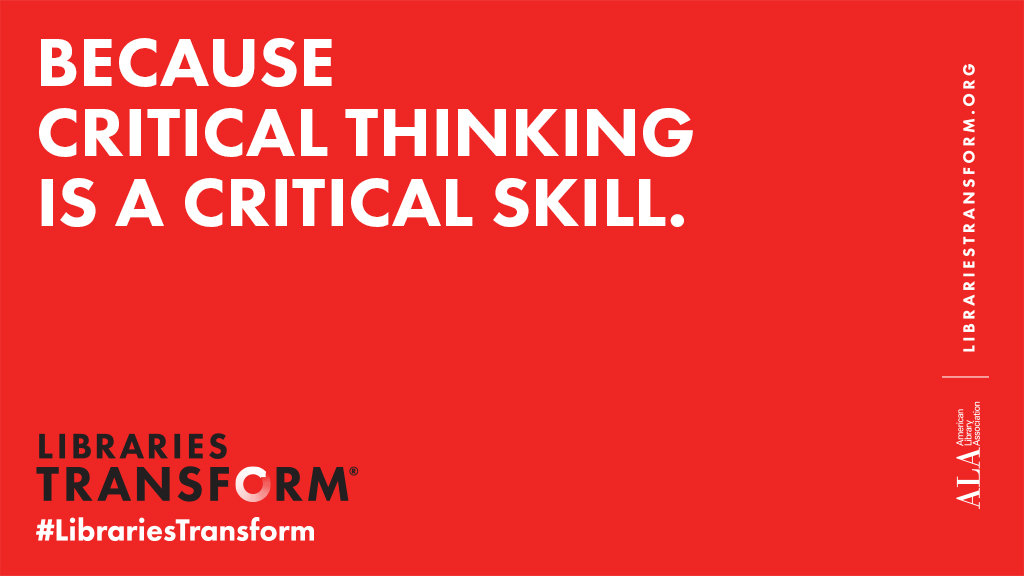
Critical thinking is “setting out to actively understand what is really going on by using reasoning, evaluating evidence and thinking carefully about the process of thinking itself.”* Thinking critically takes effort, but through preparation and education, we all can become critical thinkers.** A library is a great place to get started. Librarians are experts in information literacy: they are trained in helping the public identify accurate and reliable information.
*Chatfield, Tom. Critical Thinking: Your Guide to Effective Argument, Successful Analysis and Independent Study. SAGE Publications, 2018.
**McVey, R. Steve. “Critical Thinking Skills for Leadership Development.” Journal of Leadership Studies 2, no. 4 (October 1995): 86–97. doi:10.1177/107179199500200407.
BECAUSE LIBRARIES TAKE YOU OUTSIDE YOUR BUBBLE.
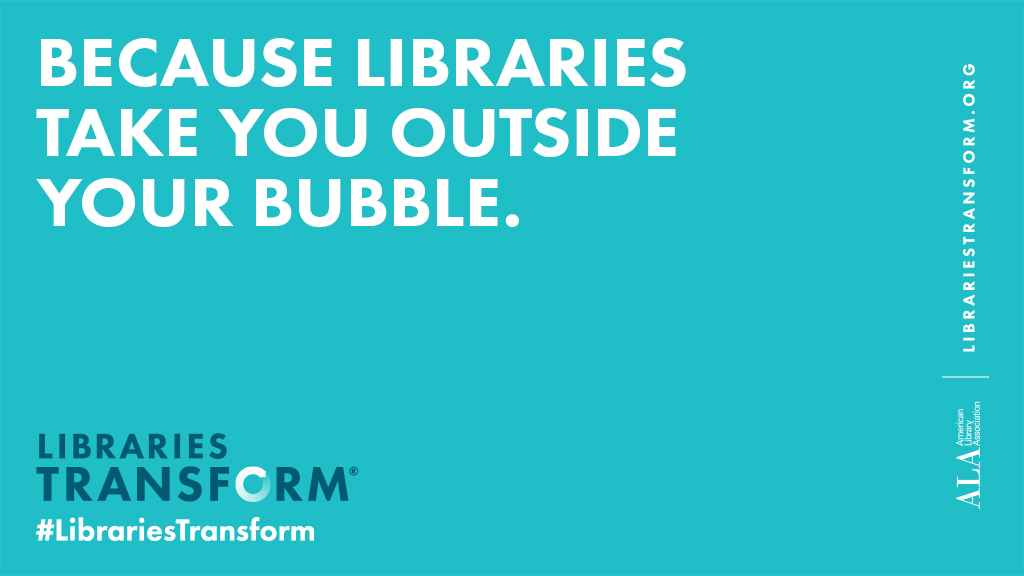
The information people see online—from web search results to social media posts—is often influenced by their own browsing behavior and social circles. It’s easy to consume information in an ideological bubble and forget to consider opposing perspectives; psychological tendencies such as the overconfidence effect lead people to have excessive faith in their knowledge, judgments and abilities.* But unlike your social media feed, libraries are filled with different opinions. Through programs that promote civil discourse, your librarian’s information literacy expertise and a vast array of print and digital resources, libraries offer you a chance to challenge your ideas and determine how strong they are, ensuring your positions are based concretely in facts as opposed to personal interests.
*Chatfield, Tom. Critical Thinking: Your Guide to Effective Argument, Successful Analysis and Independent Study. SAGE Publications, 2018.
BECAUSE THE QUICKEST ANSWER ISN’T ALWAYS THE BEST ANSWER.
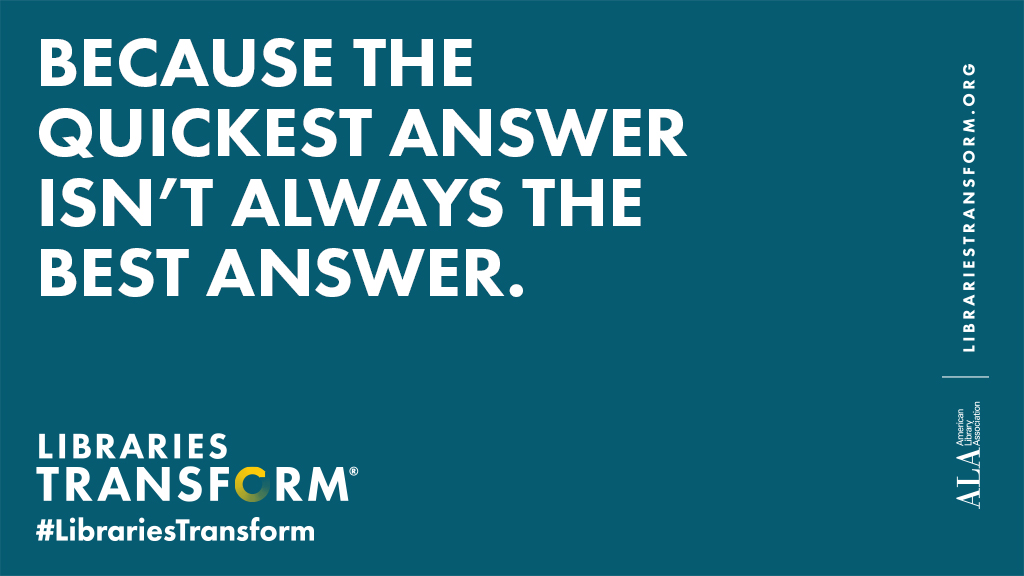
When we don’t know the answer to a question, our first instinct is often to search online for a quick solution. But the internet contains countless sources of conflicting information, much of which is outdated or incorrect, since there is no governing body patrolling content.* Visiting a library offers you a vast range of resources, tools and the support you need to find your answer: librarians are trained to locate reliable facts based on authoritative evidence.**
*Jaworski, Susan, and Roberta (Robin) Sullivan. “Google’s Evolution Leads to Library Revolution.” Journal of Educational Technology Systems 39, no. 2 (December 2010): 107–18. doi:10.2190/ET.39.2.b.
**The Institute of Museum and Library Services. “Public Libraries in the United States Fiscal Year 2015.”
BECAUSE THERE’S A STORY BEHIND EVERY HEADLINE.
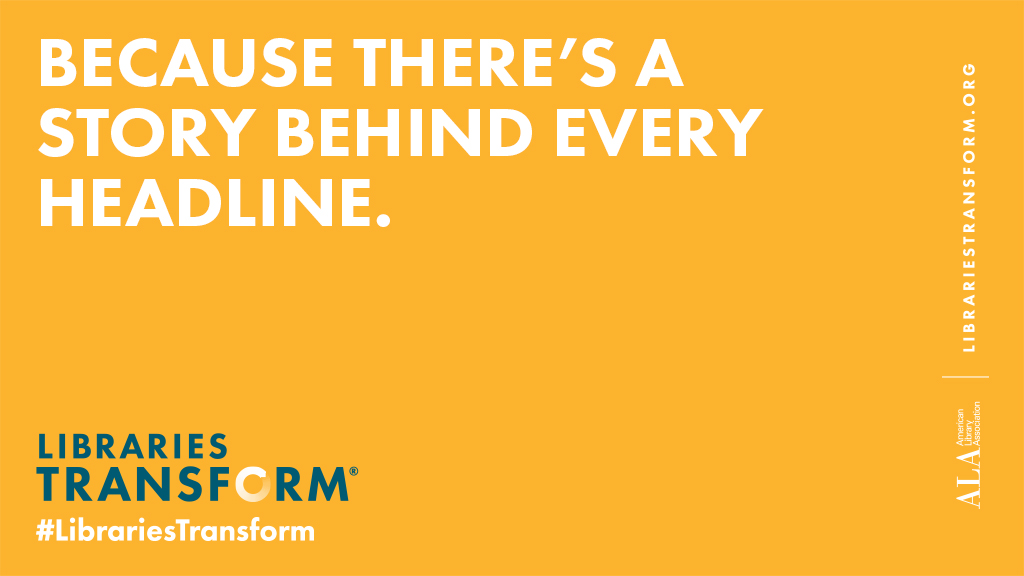
Libraries are key places to learn from the past and discover the greater context around current issues. Libraries house vast collections of primary sources and historical artifacts, from books to oral histories. In our ever-changing digital world, libraries can connect community members with online archiving services such as Internet Archive and perma.cc, which allow anyone to explore the history of the web. Understanding context is a crucial part of critical thinking, and libraries can help.*
*Banks, Marcus. “Ten Reasons Libraries Are Still Better Than the Internet.” American Libraries, 2017: https://americanlibrariesmagazine.org/2017/12/19/ten-reasons-libraries-still-better-than-internet/
BECAUSE YOUR FRAME OF REFERENCE SHOULDN’T BOX YOU IN.
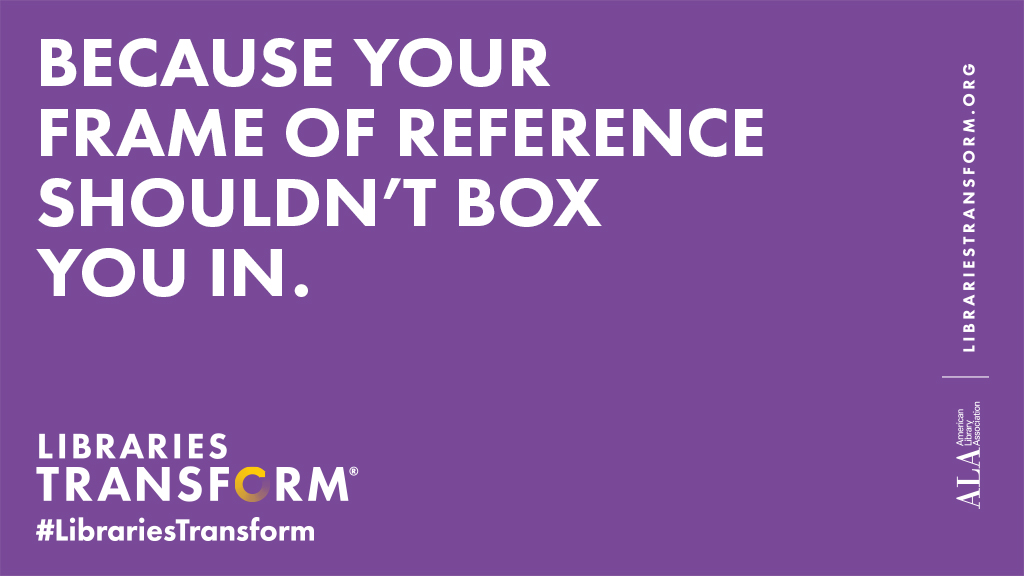
Biases, such as system or cognitive bias, cause people to act in ways that are not necessarily grounded in fact.* According to the social proof theory, people tend to do what others are doing in moments of uncertainty.** But libraries are filled with people of diverse backgrounds, interests and beliefs partaking in book clubs, teen spaces, public speaking events and more, encouraging individuals to not only learn more about each other, but about themselves too.
*Chatfield, Tom. Critical Thinking: Your Guide to Effective Argument, Successful Analysis and Independent Study. SAGE Publications, 2018.
** Facci, Eugenio L., Meredith A. Bell, and Razia Nayeem. “The Effect of Social Proof on Weather-Related Decision Making in Aviation.” Proceedings of the Human Factors and Ergonomics Society Annual Meeting 49, no. 19 (September 2005): 1780–84. doi:10.1177/154193120504901906.
BECAUSE LIBRARIES CAN HELP TAKE YOUR RESEARCH TO THE NEXT LEVEL.
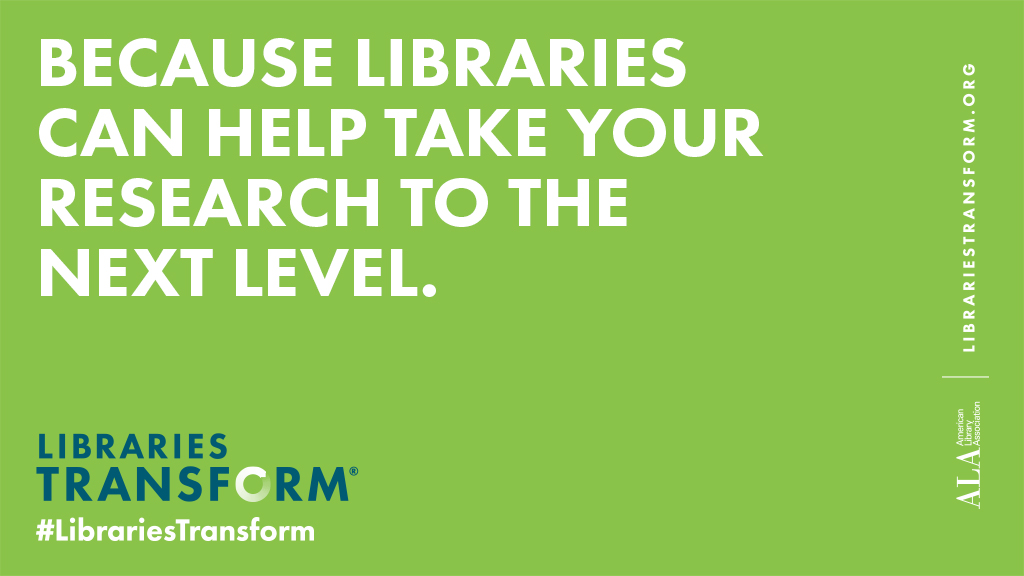
Studying a subject you care about with help from your librarian can push you in the direction of research you never thought possible. Libraries have resources to help you explore your interests from all angles, as well as for finding a publication or organization that might be a great fit for your work. Libraries can help students realize how a term paper can become funded—and eventually published—research.*
*O’Neill, Claire. “10 Ways Academic Libraries Are Leading Change.” Wiley, 2018. https://hub.wiley.com/community/exchanges/discover/blog/2018/04/08/10-ways-academic-libraries-are-leading-change
Libraries Transform Logo
Printable version of Libraries Transform Critical Thinking Toolkit (PDF)
Download the Libraries Transform logo and Because statements for print, web or social media.
Low Resolution JPG | PNG | GIF
EPS Vector Files Two Color | Black on White | White on Black | PMS | CMYK


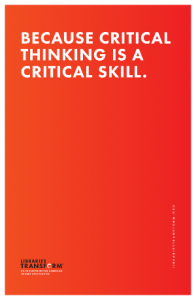
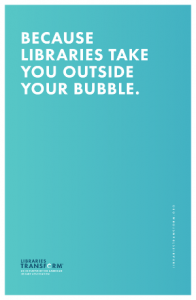 BECAUSE LIBRARIES TAKE YOU OUTSIDE YOUR BUBBLE.
BECAUSE LIBRARIES TAKE YOU OUTSIDE YOUR BUBBLE.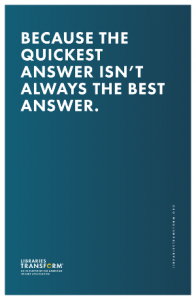 BECAUSE THE QUICKEST ANSWER ISN’T ALWAYS THE BEST ANSWER.
BECAUSE THE QUICKEST ANSWER ISN’T ALWAYS THE BEST ANSWER.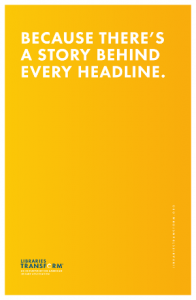 BECAUSE THE QUICKEST ANSWER ISN’T ALWAYS THE BEST ANSWER.
BECAUSE THE QUICKEST ANSWER ISN’T ALWAYS THE BEST ANSWER.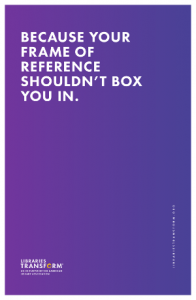 BECAUSE YOUR FRAME OF REFERENCE SHOULDN’T BOX YOU IN.
BECAUSE YOUR FRAME OF REFERENCE SHOULDN’T BOX YOU IN.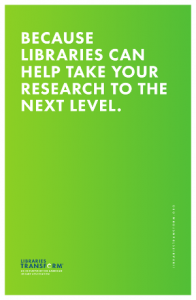 BECAUSE LIBRARIES CAN HELP TAKE YOUR RESEARCH TO THE NEXT LEVEL.
BECAUSE LIBRARIES CAN HELP TAKE YOUR RESEARCH TO THE NEXT LEVEL.